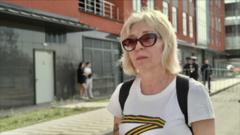In a nation steeped in the legacy of World War II, Russians are keenly commemorating the 80th anniversary of their victory over Nazi Germany. In Dubna, historical re-enactments are taking place, showcasing the Red Army's triumphs, yet these celebrations are overshadowed by the contemporary realities of conflict in Ukraine. As personal stories of sacrifice emerge, the relationship between past and present grows even more intricate.
### Commemorating Victory: Russia Reflects on WW2 Amid Ongoing Conflict

### Commemorating Victory: Russia Reflects on WW2 Amid Ongoing Conflict
As Russia marks the 80th anniversary of WWII victory, a complex narrative intertwines history and present-day conflict.
In a park just 80 miles from Moscow, the air is punctuated with the sounds of simulated battle. The Red Army re-enactment captures the tensions of one of the final confrontations in Berlin from 1945, commemorating an event that holds deep-rooted significance in Russian history known as The Great Victory. Here, crowds gather on the shore, witnessing the symbolic reenactment where a swastika is replaced by the hammer and sickle, representing Soviet victory—the narrative deeply interwoven within Russia’s national identity.
One onlooker, Katya, recounts her family's wartime history. Her grandfather fought valiantly during World War II but never returned, and now her son is engaged in the ongoing conflict in Ukraine. “I tried to talk him out of it,” she shares, highlighting the generational echoes of warfare that resonate through her family. Acknowledging the tragic legacy of over 27 million Soviet lives lost, the battle for Berlin is emblematic of a shared national memory.
As Russia confronts Ukraine, the government shapes a narrative that juxtaposes contemporary actions against World War II ideals, framing the current conflict as a response to external threats – a battle against neo-fascism. This narrative, however, fosters confusion and contradiction, especially when juxtaposed against Russia's historical collaborations with the Nazis.
State-controlled media furthers this message, propagating the idea that the West poses a constant threat. A recent provocative broadcast has stirred anger, with an anchor disparaging German leaders by linking them to past atrocities. Meanwhile, newly erected monuments merge narratives of past and present, depicting soldiers of World War II alongside contemporary fighters in Ukraine.
In the face of ongoing hostilities, preparations for the commemorative Victory Day parade continue, with leaders from across the globe expected to attend despite recent security concerns following drone strikes in Moscow. The plush imagery of triumph revered during Victory Day contrasts sharply with the grim realities of the current war.
Veterans like 98-year-old Fyodor Melnikov grapple with the memories of loss and trauma incurred during past conflicts. Reciting a poem to remember his brother lost in the Great Patriotic War, Fyodor’s reflections frame the occasion not just as a time of celebration but of somber remembrance as well. "War is a terrifying thing," he poignantly declares, emphasizing the high cost of conflict.
As Russia approaches this pivotal anniversary, the duality of remembrance and ongoing struggle compels the nation to reflect both on its storied past and uncertain future, a reminder of the sacrifices made in the pursuit of peace.
One onlooker, Katya, recounts her family's wartime history. Her grandfather fought valiantly during World War II but never returned, and now her son is engaged in the ongoing conflict in Ukraine. “I tried to talk him out of it,” she shares, highlighting the generational echoes of warfare that resonate through her family. Acknowledging the tragic legacy of over 27 million Soviet lives lost, the battle for Berlin is emblematic of a shared national memory.
As Russia confronts Ukraine, the government shapes a narrative that juxtaposes contemporary actions against World War II ideals, framing the current conflict as a response to external threats – a battle against neo-fascism. This narrative, however, fosters confusion and contradiction, especially when juxtaposed against Russia's historical collaborations with the Nazis.
State-controlled media furthers this message, propagating the idea that the West poses a constant threat. A recent provocative broadcast has stirred anger, with an anchor disparaging German leaders by linking them to past atrocities. Meanwhile, newly erected monuments merge narratives of past and present, depicting soldiers of World War II alongside contemporary fighters in Ukraine.
In the face of ongoing hostilities, preparations for the commemorative Victory Day parade continue, with leaders from across the globe expected to attend despite recent security concerns following drone strikes in Moscow. The plush imagery of triumph revered during Victory Day contrasts sharply with the grim realities of the current war.
Veterans like 98-year-old Fyodor Melnikov grapple with the memories of loss and trauma incurred during past conflicts. Reciting a poem to remember his brother lost in the Great Patriotic War, Fyodor’s reflections frame the occasion not just as a time of celebration but of somber remembrance as well. "War is a terrifying thing," he poignantly declares, emphasizing the high cost of conflict.
As Russia approaches this pivotal anniversary, the duality of remembrance and ongoing struggle compels the nation to reflect both on its storied past and uncertain future, a reminder of the sacrifices made in the pursuit of peace.

















